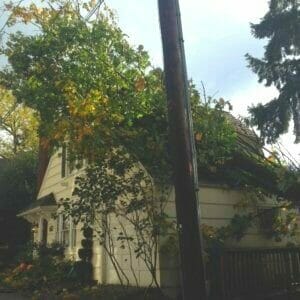The Pacific Northwest sometimes sees extreme weather, and windstorms with gusts in excess of 60 mph are not uncommon during the stormy part of the year. Such high winds take their toll sending heavy limbs, debris, and even entire trees crashing down, potentially damaging property.
Recently, a woman posted a picture on our Facebook page showing a tree that had fallen onto her house from the neighbor´s  property. She explained her confusion about who was responsible for damage from fallen trees. In this post, we’d like to explore the nuances of this situation and attempt to provide some clarity about who is responsible.
property. She explained her confusion about who was responsible for damage from fallen trees. In this post, we’d like to explore the nuances of this situation and attempt to provide some clarity about who is responsible.
As Portland certified arborists, this isn’t a new circumstance for us. In the course of providing Portland tree removal, we’ve seen plenty of neighbor disagreements about fallen trees. In every such circumstance, the first thing to consider is homeowners’ insurance. “Healthy” is a keyword when seeking tree damage coverage under homeowner policies. When a healthy tree falls it is considered an act of God or Nature, and your homeowner’s insurance will cover the cost of damages to your property (minus the deductible and within the provisions of your policy). If the fallen tree is not considered healthy, you face an additional layer of complexity.
Portland Tree Care Experts on Tree Damage Liability.
Let’s take a look at insurance coverage in various possible scenarios.
Your tree falls on your house. Your homeowner’s policy should cover this; however, you should be aware of your policy coverage limits. Chances are that you will have to pay a deductible before coverage kicks in. Your coverage likely includes your main home, garage, sheds, and other outbuildings. If structures have been damaged, the policy should also cover debris removal.
Your tree falls on your neighbor’s house. Under most conditions, your neighbor’s homeowner’s policy will cover damage to their property.
What about the damage that could have been avoided? As a homeowner, it is your responsibility to maintain your property, including your trees. If your trees have existing damage such as visible rot and don’t take care of it, you could be deemed liable if the tree falls.
Be a good neighbor. Avoid liability and prevent neighbor bickering; maintain your trees and regularly inspect for damaged branches, disease, and rot. Of course, as Portland tree care experts, we are available to help in this and all other aspects of tree maintenance. Additionally, we consider it good form to offer to pay for or split your neighbor’s deductible if your tree damages their property. There is no guarantee they will do the same for you if the situation is reversed, but in our experience, it is best to give them the benefit of the doubt.
On the other hand, if you see that your neighbor has damaged or rotting branches that could potentially harm your property, it is advised to write your neighbor a friendly letter to let them know and to ask them if they could remove or trim the tree in question. You can also send a copy to this letter to your insurance company. The goal here is to kindly remind neighbors that if their unhealthy tree causes damage to your property, they could be liable.
Everyone here at Urban Forest Professionals is here to help as well. Our arborists can give a thorough and professional inspection, including diagnosis of potential problems. We can then remove damaged and diseased branches/sections, relieving you of any potential liability.
Remember—you are not liable for any damage that your healthy trees do to your neighbor’s property, but this only applies to healthy trees. You can be held liable if regular maintenance could have prevented the damage. Therefore, it’s best to arrange for regular tree care. Call us today about a tree inspection; by ensuring the health of your trees, you could be saving yourself hundreds of dollars on damage liability down the road.
This post first appeared on https://www.urbanforestprofessionals.com